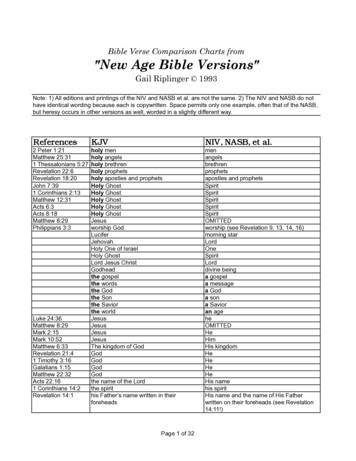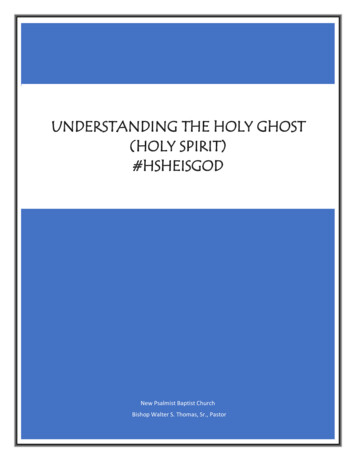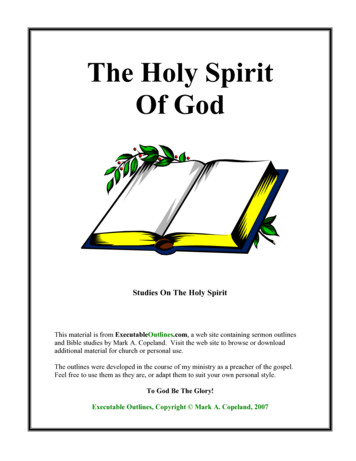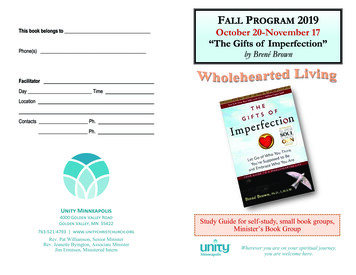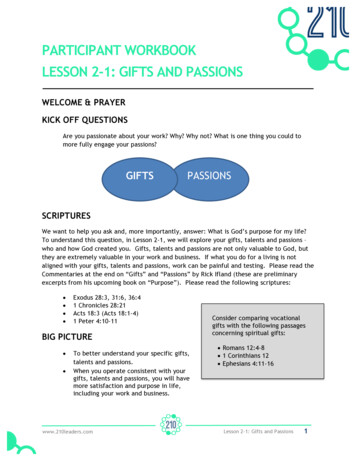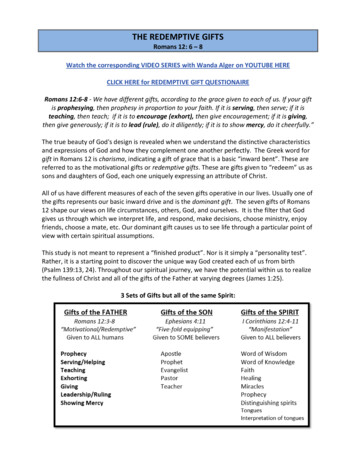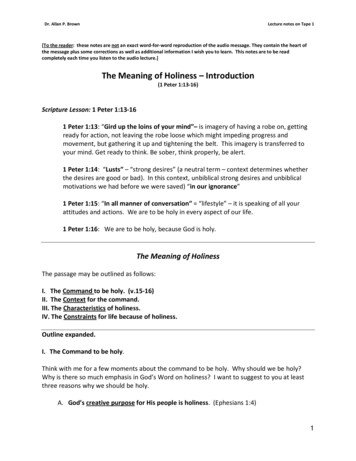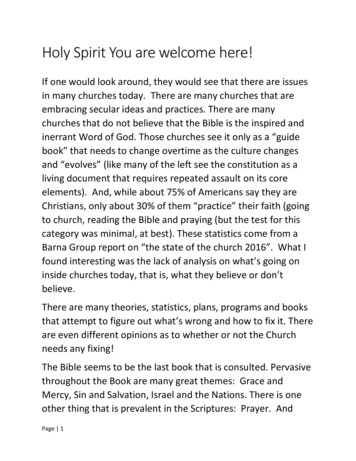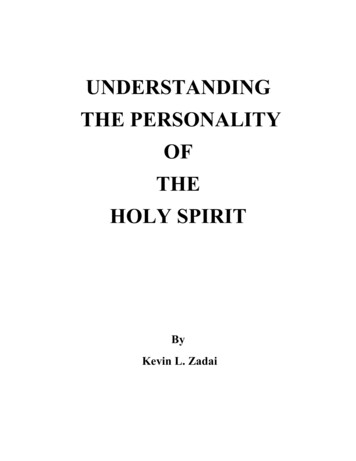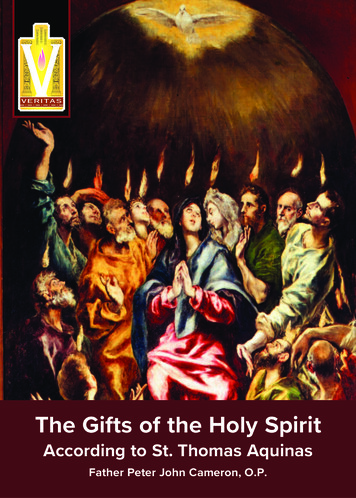
Transcription
VVERITASThe Gifts of the Holy SpiritAccording to St. Thomas AquinasFather Peter John Cameron, O.P.
The Veritas Series is dedicated to Blessed Michael McGivney(1852-1890), priest of Jesus Christ and founder of theKnights of Columbus.
The Knights of Columbus presentsThe Veritas Series“Proclaiming the Faith in the Third Millennium”The Gifts of the Holy SpiritAccording to Saint Thomas AquinasbyFather Peter John Cameron, O.P.General EditorFather John A. Farren, O.P.Catholic Information ServiceKnights of Columbus Supreme Council
Nihil ObstatDonald F. Hagerty, S.T.D.Censor DeputatisImprimaturRobert A. Brucato, D.D., V.G.Archdiocese of New YorkMay 28, 2002The Nihil Obstat and Imprimatur are official declarations that a book or pamphlet is freeof doctrinal or moral error. No implication is contained therein that those who havegranted the Nihil Obstat and Imprimatur agree with the contents, opinions, or statementsexpressed.Copyright 2002-2021 by Knights of Columbus Supreme Council.All rights reserved.Citations from the Catechism of the Catholic Church are taken from the Catechism of theCatholic Church for the United States of America, copyright 1994 by the UnitedStates Catholic Conference, Inc., Libreria Editrice Vaticana. All rights reserved.Scriptural quotations are taken from The New Oxford Annotated Bible With the Apocrypha(Expanded Edition), Revised Standard Version copyright 1973, 1977, Oxford UniversityPress. Some citations have been adapted.Cover: El Greco (1541-1614), The Pentecost. Museo del Prado, Madrid, Spain. Scala/Art Resource, New York.No part of this book may be reproduced or transmitted in any form or by any means,electronic or mechanical, including photocopying, recording, or by information storageand retrieval system, without permission in writing from the publisher. Write:Catholic Information ServiceKnights of Columbus Supreme CouncilPO Box 1971New Haven, CT 800-735-4605 faxPrinted in the United States of America
CONTENTSINTRODUCTION .5What are the Gifts, exactly? .Who needs the Gifts? .How do we obtain the Gifts? .The Gifts make us like Christ .6778THE SEVEN GIFTS OF THE HOLY SPIRIT .9The Gift of Fear of the Lord .The Gift of Piety .The Gift of Knowledge .The Gift of Fortitude .The Gift of Counsel .The Gift of Understanding .The Gift of Wisdom .9131619222528THE BLESSED VIRGIN MARY AND THE GIFTS OF THE HOLY SPIRIT .31The Annunciation to Mary and the Gift of the Fear of the Lord .The Visitation of Mary and the Gift of Piety .The Presentation in the Temple and the Gift of Knowledge .Finding in the Temple and the Gift of Fortitude .The Wedding Feast at Cana and the Gift of Counsel .“Who is my Mother?” –The Gift of Understanding .The Passion, Pentecost and the Gift of Wisdom .31323436373940ABOUT THE AUTHOR .43
INTRODUCTIONAll through history, God has revealed himself as the supreme GiftGiver.Creation is a gift. Life is a gift. The Lord gave his covenants as gifts,and called Abraham, Moses, and the Jewish People to himself all out ofsheer generosity. Moreover, God sent his Son to us as a gift, and Christ wonfor us all the gift of eternal life.God wants nothing more than to share his own life with us. TheLord wants to make us, as Scripture says, “sharers in the divine nature”(2 Peter 1:4). As creatures, however, and sinful ones at that, we need to beprepared and elevated by God before we can be perfectly united with him.In a word, we must be changed.Part of our transformation into the people God wants us to behappens because his grace makes us virtuous. To be virtuous means notonly to do right, but to be the kind of person who does what is goodreadily, spontaneously, and with joy. The life of the virtues prevents evilsfrom poisoning the love in our hearts, and frees us to advance in godliness.But besides strengthening us in goodness, God also infuses into our soulsthe gifts of Faith, Hope and Charity—the “theological virtues,” which arenothing less than a sharing in God’s own divine knowledge and love.Through Faith, Hope and Charity we are brought to live in union with theHoly Trinity even during our life on earth.In giving us the theological virtues, the Holy Spirit makes hisdwelling in us and enlivens us with rich blessings of every description,making us daily more like Christ and guiding us to the life of perfectionin heaven.Scripture emphasizes two groups of blessings that the Holy Spiritgives to those who receive him. First, there are the twelve “Fruits of theHoly Spirit” that Saint Paul names for us in his letter to the Galatians:love, joy, peace, patience, kindness, goodness, generosity, gentleness,faithfulness, modesty, self-control and chastity (Galatians 5:22–23).-5-
In addition, the Spirit endows us with blessings we traditionally call theseven “Gifts of the Holy Spirit.” These particular gifts are lasting (but notindestructible) endowments that perfect the good habits and naturalpowers of the human soul and have the effect of making us supernaturallysensitive and supernaturally responsive to the guidance and inspirationsof God.The prophet Isaiah speaks of these seven Gifts when he writes,prophesying about the coming of Christ (the “flower of Jesse”):A branch will sprout from the root of Jesse, and from his roota flower will rise up: and the spirit of the Lord will rest uponhim: a spirit of wisdom and of understanding, a spirit ofcounsel and of fortitude, a spirit of knowledge and of piety,and he shall be filled with the spirit of the fear of the Lord1(Isaiah 11:1–3).These seven Gifts—Wisdom, Understanding, Counsel, Fortitude,Knowledge, Piety and Fear of the Lord—are spoken of throughoutScripture, and have been received and explained by saints throughout theages. Of these, the 13th century Dominican theologian Saint ThomasAquinas offers us what is perhaps the clearest and most thoroughexplanation of how the Gifts work in our life. In this booklet, our goal isto present Saint Thomas’s explanation, together with his description ofhow we can see the Gifts at work in the woman who was the most perfectdwelling place of the Holy Spirit, the Blessed Virgin Mary.What are the Gifts, exactly?The Gifts of the Holy Spirit are blessings given to our souls, toenhance and refine the natural powers that our souls possess. “‘Soul’ refersto the innermost aspect of man, that which is of greatest value in him, thatby which he is most especially in God’s image: ‘soul’ signifies the spiritual2principle in man.”God the Holy Spirit is always at work prompting us and leading usto greater purity, greater love, and greater holiness. However, even withthe theological virtues of Faith, Hope, and Charity, our hearts can remain-6-
insensitive to the Holy Spirit. The seven Gifts are the remedy for thisdullness. They enhance the powers of the soul and make our hearts moresensitive to God, so that we can easily and consistently follow themovements and inspirations of the Holy Spirit. The Gifts are lasting,habitual dispositions that keep us keenly attuned and devotedly responsiveto even the smallest promptings of God. They make us ready for Hisinitiatives, and enable us to act in a holy, even God-like way.These seven graces are called “Gifts” for two reasons. First, they are“Gifts” because God infuses them in us without expecting any payment.Second, they are “Gifts” because they give us the privilege of respondingto divine inspirations. The name “Gifts,” given in Scripture, seems mostappropriate when we consider what supreme blessings and benefits Godgives us through them.Who needs the Gifts?We all need the Gifts of the Holy Spirit, since without God’s help itis impossible for us to find our way to him. Besides needing for our sins tobe forgiven, we need God to overcome our vices, foolishness, ignorance,mental dullness, and other defects of mind and soul. He does this in amagnificent way by giving the Gifts, since these more than compensate forthe weaknesses of our fallen nature and remedy the spiritual sicknesses thatkeep us from full communion with God. The Gifts are more than aremedy, and they strengthen and confirm us in following the goodinspirations and guidance of the Holy Spirit. The Gifts bring us to hearand obey God readily, and they make doing his will our supreme delight.How do we obtain the Gifts?The seven Gifts, like the theological virtues of Faith, Hope andCharity, are given to us in Holy Baptism. Once given they enhance thesoul and exist as new, supernatural faculties or powers. Unlike the naturalfaculties, however, the Gifts depend directly upon God for their exercise.We have by nature the power to think and reason (for example), but whenwe are brought to life by God’s grace we are endowed with the Gifts as-7-
supernatural faculties, senses (as it were) that make possible our life as newspiritual creatures. The real action or operation of the Gifts—and thustheir benefits—depend upon the further working of God. In fact, theoperation of the Gifts is often hidden to us. It is not unusual for them tobe revealed only in retrospect, through an enlightened examination of ouractions. This is not surprising since at the time of the Gifts’ activity ourattention will be on God and on other objects as they relate to him.The operation of the Gifts of the Holy Spirit depends primarily andessentially upon the grace of God. For our part, we can cultivate them byavoiding sin and by exercising the moral and intellectual virtues. Full ofready obedience, we must disown whatever could impede or offerresistance to the movement of the Holy Spirit. For instance, if we arestubborn, selfish, or self-indulgent, we are creating obstacles in our soulsand are impeding the work of grace. We cannot enjoy the Gifts of the HolySpirit in a stable or lasting way as long as we remain willing to sin, orunresolved in our determination never to offend God. “No one,” Christreminds us in the Gospel, “can serve two masters” (Matthew 6:24).The Gifts of the Holy Spirit appear when we are living in true,divine Charity. When we love God above all things, and when we love allthings for his sake, then that same spiritual fire of love makes us keenlysensitive to his direction. Thus the Gifts appear with Charity, and in turnthey lead back to greater holiness and to greater love. The Gifts are alwayspresent all together, since in the life of divine love they form an organic,integral whole. (This is so even though, in particular cases, the operationof a particular Gift is needed and evident.) In Charity, the Gifts cannot bedisconnected or parceled out separately, and they work in such a way thatthey reinforce, complement, and replenish each other inasmuch as they acttogether to keep us attuned to doing whatever God wants.The Gifts make us like ChristSince the Gifts bring about exquisite sensitivity and responsivenessto God, we can say that they are, in a sense, the crowning dignity of ourhuman nature. Even Our Lord Jesus Christ himself, as true man, was-8-
endowed with the Gifts. In his infinite and loving wisdom, God hasordained that it is only through the Gifts of the Holy Spirit that soulsshould be made fully attentive, alert, and heedful to the Spirit’s urgings.In receiving the Gifts, we are brought into a deeper conformity to Christ,who, in his perfect humanity, was supremely and perfectly sensitive andsubject to the inspirations of God.Our sharing in the glory of the Gifts of the Holy Spirit is not limitedto the time of our short life on earth. It is true that, in this present life, theGifts assist us in those areas that purify and perfect our relationship withGod. They especially protect us against temptation and the trials broughtabout by evil. But in heaven, our entire life will be one of following themovements and life of the Holy Spirit. The Gifts will enable us toparticipate in the very life of the Holy Trinity, in a way that only Godhimself can teach us. In their essence, then, the Gifts of the Holy Spiritwill continue to last and be active in heaven. There they will be fullypermanent and perfect, enabling us to enjoy total communion with Godand with all the angels and saints in him. Together we will exult in God’sown love and beauty, and will share in them together as his belovedchildren for ever.THE SEVEN GIFTS OF THE HOLY SPIRITThe Gift of Fear of the LordWhy would God want to give us a gift called “Fear of the Lord?”How could fear ever be good and desirable? Saint Thomas Aquinas tells usthat we need the Gift of fear as a kind of first beginning of the perfectionof all the Gifts. For the Fear of the Lord conditions us to show properreverence to God and to be completely devoted to him. In this way, Fearof the Lord is a kind of foundation on which the other Gifts are built.Like all the Gifts of the Holy Spirit, Fear of the Lord is a habitualperfection of the powers of the soul that makes the believer responsive tothe inspiration and movements of the Holy Spirit. When we say this, wemean that Fear of the Lord is a lasting and stable condition, a refinement-9-
or disposition that makes us consistently and happily receptive to God.Without being receptive, without being submissive and docile (teachable),how could we go on to enjoy the other Gifts? The Fear of the Lord pavesthe way for the rest of the Gifts by leading us to revere God and avoidanything that might alienate us from him.The Fear of the Lord is not a matter of anxiety or terror. Rather, it ismarked by a calm yet eager resolve. How does Fear of the Lord help usfollow God? Saint Thomas helps us see how when he points out a commonfact of life: before people can begin to do good, they must first withdrawfrom evil. As we know from our own experience, fear always involvesturning away from something that we consider a threat to our wellbeing.In our relationship with God, fear can play a role in two ways. First,fear can be a fear of punishment (especially Hell). We can and should turnus away from evil, run to God, and stay close to him whenever we feelintimidated by the reality of punishment. Saint Thomas refers to this kindof fear as “servile” fear, or the fear of one who obeys the master because ofthe possibility of punishment. Servile fear, however, does not involve thefull range of freedom and grace that Our Lord wants us to enjoy. There isa second and holier kind of fear that has to do not with punishment, butwith the wonderful good of communion with God.This second kind of fear is not afraid of punishment but of losingGod. Saint Thomas calls this “filial” fear, the fear of sons, since it is thekind of fear a good son should have about ever violating or losing hisrelationship with his father. To have filial fear means to be eager to avoidthe evil of offending God or doing anything that might damage ourrelationship with him.The Holy Spirit’s Gift, Fear of the Lord, is a Gift of filial fear. By thisGift, we respond to the Spirit’s guidance in withdrawing from evilpleasures out of love for God. In fact, this Gift transforms the way weregard God. Saint Thomas goes so far as to say that the charity whichinforms the gift of fear enables us to look upon God as at once our father,and even our spouse! In other words, the Charity (love) active in Fear of theLord is one that makes us keenly sensitive to how God loves us and to how- 10 -
we need to answer that love. Through Fear of the Lord, we become deeplysensitive to anything that might diminish our life of loving God and ofenjoying his love.There is, then, something quite ironic about Fear of the Lord. Thisfear is produced by love. As Saint Thomas explains, love is the mother ofwhich fear is born, for a person fears to lose only what he loves. When ourdesires get firmly fixed on something, we loathe ever losing it. To bedeprived of the object of our affections is something we fear as an evil. Inthis respect, then, fear of its very nature arises from love. This insight urgesus to ask ourselves the question: “What do I really fear losing?” If we seewhat we are afraid to lose, then we will see what we really love in life.With this understanding of fear, we can see why it is right to say thateven Jesus himself had the Gift of Fear of the Lord. For when we fearanother person with filial fear (even a divine person, like God the Father),we are fearing the loss of some overwhelming good. What Christ feared—what he was eager never to lose—was what is most overwhelming in God,in particular his infinite love. As a result, Jesus’ human soul was movedunder the impulse of the Holy Spirit to a profoundly awed reverence ofGod. Saint Thomas comments that, as man, Christ had a deeper sense ofreverence for God than anyone else ever had.Because of this holy, loving fear, Jesus did not turn away from hisagony or the anguish of the Passion. Something greater than the tormentof torture overwhelmed him and moved him to reject utterly any deed thatwould have separated him in the slightest way from doing the will of hisFather. Thus it was precisely the evil of violence and punishment—the evilthat was meant to discourage Jesus (“Do you not know that I have thepower to crucify you?” [John 19:10])—that urged him on! For byfaithfully responding to the Gift of Fear in his human soul, Jesus providedthe way for the servile fear of others to be transformed into authentic filialfear. By his own suffering and love, Jesus teaches us and enables us to seekreconciliation and unending communion with God above all things.In Jesus’ Fear of the Lord we come to understand how we can expectthe Gift of Fear will be active in our own souls. As we see in the Passion,- 11 -
one chief effect of Fear of the Lord is a total and pure humility. With Fearof the Lord, we are not only willing but eager and joyful at the prospect ofenduring suffering for the sake of God and his plan of salvation. Holy Feardisciplines us, so that we stop seeking glory for ourselves, but instead seekGod’s glory and our own happiness in him. Fear of the Lord reveres andloves God, and so uproots the very beginnings of human pride. Fear is aremedy for all pride and arrogance of spirit, which are the evils most likelyto lead us away from the Lord.This effect of humility increases in proportion to our charity. Themore we love God, the more we fear to offend him and to be separatedfrom him. Yet the more we love God, the less we fear punishment—truelove saves us from being preoccupied with our own welfare, and makes uspay attention not to punishment but to the awesome love that we cannotafford to lose. The humble love that securely attaches us to God also causesus to have greater confidence of reward, and consequently less fear ofpunishment.A second effect of Fear of the Lord, then, is the enhancement ofHope. Saint Thomas notes that Fear humbles the spirit so that it will notgrow proud about present things. And it strengthens us with the bread ofhope as we look forward to things yet to be. The Spirit’s Gift does notmake us worry about whether God will save us, but makes us eager toavoid any disregard or sin or neglect on our part that would reject ordiminish the effectiveness of that divine help. This way, Fear and Hopework together. Hope is confident that God will do great things for us,while Fear keeps us pure and humble, in the perfect state to receive theloving graces of God. In a sense, Hope even makes Fear more intense, sincethe more we confidently hope for from another (from God, in this case),the more eager we will be not to forfeit that gift by offending ourbenefactor or by separating ourselves from him.Fear of the Lord also enables us to live the Beatitude, “How blessedare the poor in spirit” (Matthew 5:3), in a more authentic way. For the Giftof Fear does not only liberate us from seeking the self-exaltation of pride;it also saves us from craving the fame that can be gained through exteriorgoods, such as honors and wealth. Thus, through Fear we become eager for- 12 -
God alone, and are set free from the pride and greed that would send usracing after treasures other than God himself.Fear of the Lord also strengthens the virtue of temperance (thatvirtue that keeps us free and reasonable about things that are pleasurableto the body). Because the Gift of Fear of the Lord prompts us to look toGod first of all while shunning everything that could offend or separate usfrom him, this Gift also readily restrains us from giving ourselves up tobodily delights. When we love God above all and are lead by the HolySpirit to prize his love absolutely, then we are more easily going to avoidsins related to bodily desire and pleasure.Saint Thomas tells us that, of all the seven Gifts of the Holy Spirit,Fear of the Lord comes first in the order of need, last in the order ofnobility. Fear of the Lord opens a door for doing good. It is the foundationor beginning for the activity of all the other Gifts. In this way, “the fear ofthe Lord is the beginning of wisdom” (Psalm 111:10)—it is where wisdomhas its roots, and where it first begins to come alive.In heaven, when love is perfect, there will be no room for fear ofpunishment (1 John 4:18) and no possibility of offending God.Nevertheless, we can still say that the holiest part of fear—reverence forGod—will remain even in the glory of heaven. There, Fear will not involveany anxiety or concern about sinning, but will be perfect in completepeace, in the absolutely firm and final rejection of evil, and in the totaltranquility in loving God above all and in all.The Gift of PietyCan we ever show God the kind of honor and devotion that hedeserves? Try as we might, we will never be able to do so on our own. Ifwe are ever going to render to God the kind of homage that we owe himas his creatures and adopted children, then we will need the help of theHoly Spirit. The Gift of Piety is the particular Gift by which God theHoly Spirit himself enables us to come to God paying the kind of homageand worship that is appropriate and best. The fact that only God can leadus to praise and honor him in a fitting way is expressed by the Church in- 13 -
one of the prayers of her liturgy: “Father, you have no need of our praise,yet our desire to thank you is itself your gift. Our prayer of thanksgivingadds nothing to your greatness, but makes us grow in your grace, through3Jesus Christ our Lord.”The Gift of Piety helps to realize the ultimate purpose of ourexistence: “God puts us in the world to know, to love, and to serve him,4and so to come to paradise.” While Fear of the Lord helps us shun evils,Piety enables us to make a right and holy approach to God so as to deepenand advance our relationship with him through worship and good works.To understand the Gift of Piety—that is, the special disposition ofsoul by which the Holy Spirit makes us more sensitive to his ownguidance—we must know what piety is in general. Unfortunately, piety isoften misrepresented and parodied by misconceptions, prejudices, andstereotypes. We tend to confuse true piety with a kind of pretendedsweetness, with superficial exterior devotion, and with fake emotionalismin church. Authentic piety, however, is far from all these things. Realpiety, in fact, is a virtue that governs our behavior at all times, and notonly when we are engaged in prayer, worship, and other acts of religiousdevotion. The essence of true piety lies in showing appropriate honor,respect, and appreciation to those deserving of such esteem.In speaking of piety (the general virtue, not the Gift), Saint ThomasAquinas explains that it is concerned with fulfilling our duty andconscientious service towards those who are significant in our life. First andforemost among these stand those to whom we are related, our flesh andblood, and especially our parents. Piety also involves patriotism, our dutyand devotion to our country. Saint Thomas says that piety denotes thereverence which we have for our father and our fatherland. But the virtue ofpiety naturally extends its regard to all those with whom we share a commonallegiance or interests; thus, it is ordered to the common good of all.With this in mind, we can see how the virtue of piety matches theGospel call to justice: piety makes us acknowledge how indebted we are toothers, either because of a superior role they play in our life (as in the caseof parents, teachers, coaches, and others in authority) or because of specific- 14 -
benefits they contribute (as with friends, benefactors, co-workers, andsupporters of all sorts). As a matter of justice—giving each person what ishis due—piety impels us to show gratitude and appreciation to anyonewho is a source of life, maturity, human development and personalenrichment in our life. As a virtue, piety affords us the opportunity to givesanctified expression to the love we bear for and owe to family, nation,friends, colleagues, and associates.Like all the gifts of the Holy Spirit, the Gift of Piety is a lastingperfection or refinement of the powers of our soul. Specifically, Pietymakes us readily responsive to the promptings of the Holy Spirit with5regard to honoring God as our Father. Saint Thomas explains that, becauseGod is called our Father par excellence, homage to him is termed piety.Made receptive by the Gift of Piety, we are lead to honor and serveGod in the spirit of sonship. Piety is a Gift by which we are brought toparticipate very practically in the Sonship of Jesus Christ, the eternal anddivine Son of God. At the same time, the Gift of Piety offers honor andservice to all people on the basis of our relationship to God as his children.For this reason Saint Thomas notes that the Gift of Piety inspires any actby which a person does good to all out of reverence for God.Solicitude for others is the second concern of the Gift of Piety. ForPiety, like God, remains concerned with coming to the aid of those inneed. Saint Thomas quotes Saint Augustine in this regard, who says thatwe pay homage to those whom we cherish by doing honor either to theirmemory or their company. By reaching out to others in their actualstruggles, we honor the Father by serving his children. This dynamic ofself-giving service remains the very lifeblood of the Church, as is witnessedby the mutual love and constant intercession of the saints in heaven. SaintThomas points out that the saints continue to manifest the Gift of Pietythrough the honor they show each other in heaven, and through thecompassion they show to us on earth in our moments of misery. The saints’intercession on our behalf is at root a pious impulse.Saint Thomas connects the Beatitudes “Blessed are they who hungerand thirst after justice” (Matthew 5:6) and “Blessed are the merciful”- 15 -
(Matthew 5:7) with the Gift of Piety because Piety fills the heart witheagerness to do works of mercy. The Gift’s principal act of filial reverencefor God will remain even in heaven, for the deep affection that we have forothers will only increase as we enter into the rejoicing of the saints. Inheaven, piety is exercised as the saints manifest their love for God byhonoring him together and by honoring the wonders his grace has done inall the elect. The Gift of Piety persists in heaven, where it enhances themutual joy and delight the holy ones experience in each other’s company.Now although the Gift of Piety naturally affects the way we worshipGod in prayer and in other religious practices, it is mainly a matter of ourdevotion to God as his adopted sons and daughters in Christ. The Gift ofPiety reminds us that we are God’s children, and it gives us specialconfidence and satisfaction in that recollection. Thanks to this Gift, weoffer true worship and service to God the Father, the saints are honored,good works are done to relive human misery, and we are lead to rejoice aswe are adopted into the life of the Trinity.The Gift of KnowledgeIn our world there are as many opinions as there are people (if notmore!), and when it comes to questions of religion we find that even in theChurch we can hear voices of dissent and confusion that would pull usaway from God’s Truth. How can we know what we need to believe, andhow to assess things according to Faith? One grace God gives us to enableus to make a complete and penetrating assent (agreement) to the truth offaith is the Gift of Knowledge. The Gift of Knowledge is a perfection ofthe human mind that disposes us to follow the impulses of the Holy Spiritwhen we judge human or created things in relation to God. Through theGift of Knowledge, the Holy Spirit guides our judgment so that we canrecognize created things—especially human thoughts, words, inclinations,circumstances, and deeds—in the light of Faith.The Gift of Knowledge, when operative, is concerned withdifferentiating between what is and is not consistent with Faith. By thisGift, God enables us to recognize when a human and temporal thing—a- 16 -
plan, a practice, an idea—ought to be received as consistent with therevealed truth or not.Unlike God himself, whose
The Veritas Series is dedicated to Blessed Michael McGivney (1852-1890), priest of Jesus Christ and founder of the . Robert A. Brucato, D.D., V.G. Archdiocese of New York May 28, 2002 . Creation is a gift. Life is a gift. The Lord gave his covenants as gifts, and called Abraha
